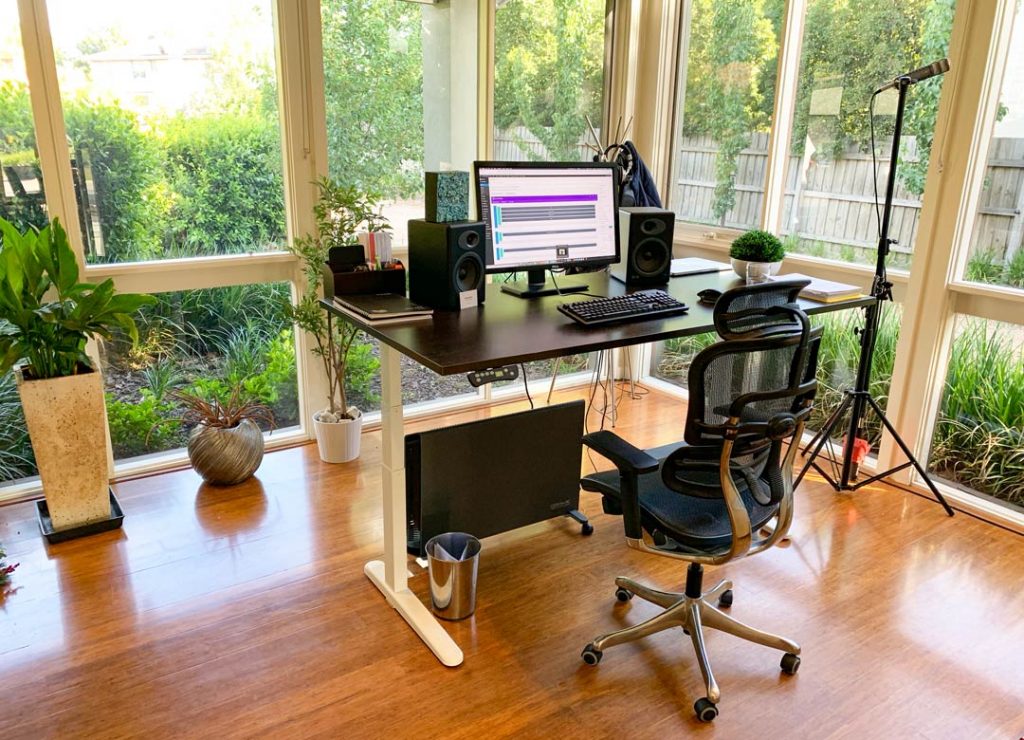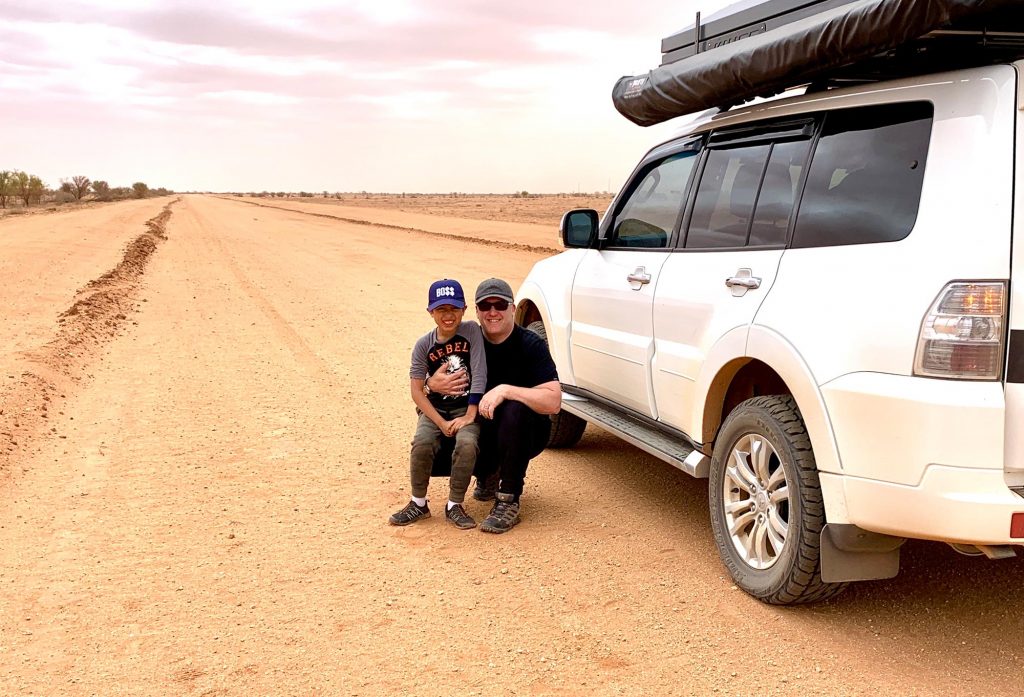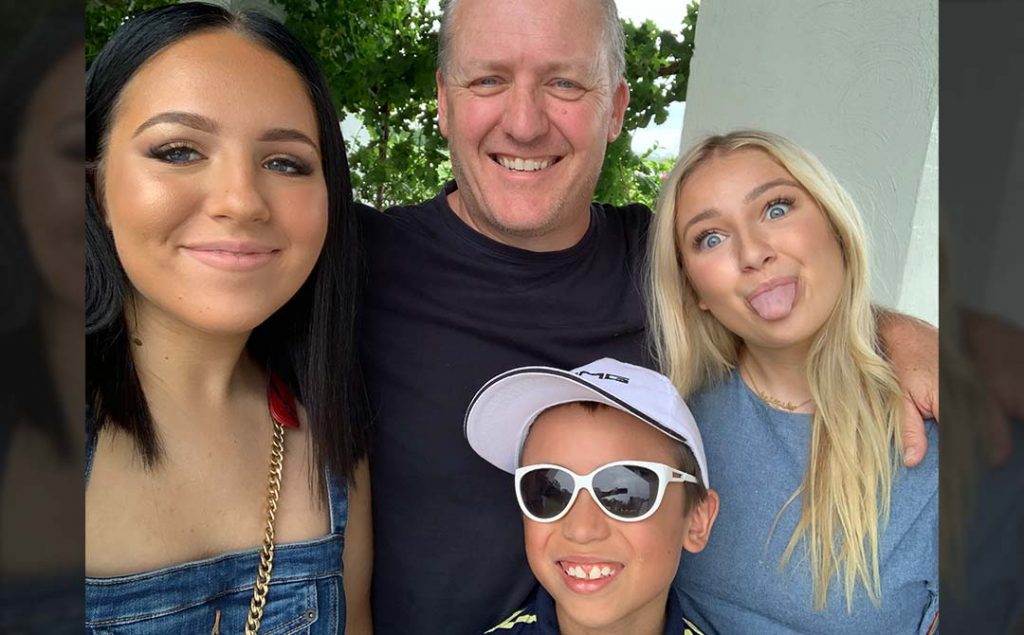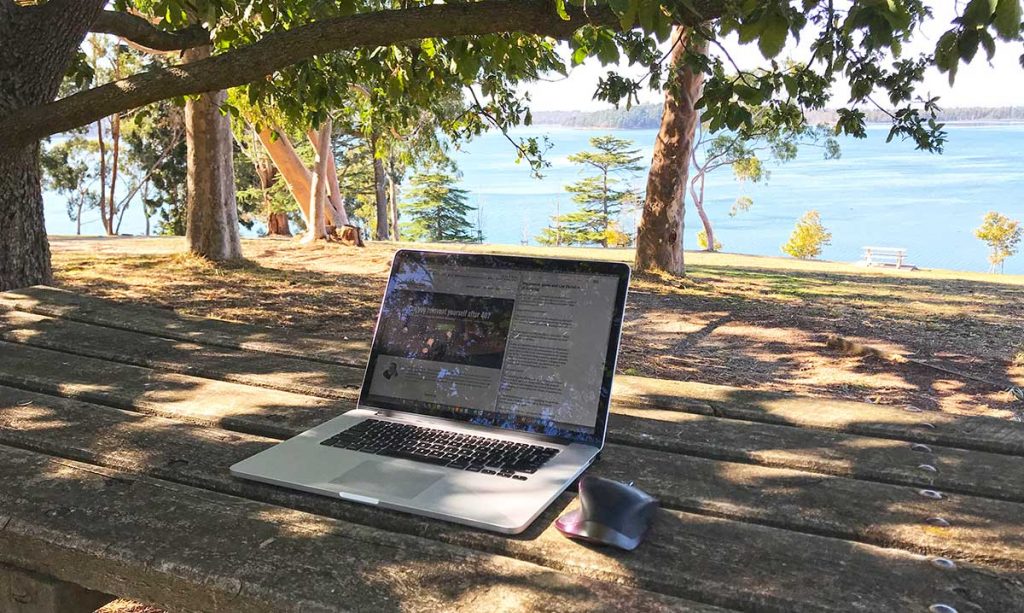1. Hey, can you please introduce yourself?
My name’s Peter Fritz, and I’m the founder of OfficeAnywhere.co, a website that helps people to live and work on their terms. I’ve been a writer, web designer, and marketer for decades, and have worked remotely for over 20 years – mostly from my home office in Melbourne, Australia.

In early 2016, I created MidlifeTribe.com to share my many failures and fleeting successes after my divorce, financial collapse, and subsequent midlife crisis. Today, I share ideas on the life-changing benefits of remote work and living intentionally at officeanywhere.co.
I believe that getting control over how, when, and where we work reduces stress. It helps us reconnect with our families, frees up bandwidth to explore other opportunities, and saves time (I save around 500 hours a year not commuting).
For those who crave freedom and control over their life, working remotely is a game-changer. Right now, thousands of people are experiencing remote work for the first time, thanks to the global pandemic. The question is, how many will want to return to their ‘normal’ work arrangement once the crisis ends? I suspect many will resist the call when it eventually comes.
I am a father of three kids; a husband, an ex-husband (twice), a writer, podcaster, photographer, and outdoor adventure-lover. When I’m not working on Office Anywhere, the things that light me up are road trips, camping, sports cars and motorbikes – preferably with my family.

2. What motivated you to choose remote working?
After a number of years in the corporate world, I discovered that traditional workplace incentives created a subtle form of entrapment. They lured me into an endless cycle of working to pay for what I’d already bought.
Promotions, salary increases, and status elevations only served to prop up the lifestyle upgrades I’d factor in ahead of time.
After a while, I began to see that money and status (at least the kinds conferred to me by an employer) weren’t the game at all. Freedom, autonomy, and flexibility to pursue other opportunities were.
It came to a head when, some 20 years ago, I approached my boss with the idea of working from home. My role at his software company involved building marketing channels for our enterprise solution, so it seemed an ideal fit.
This was the beginning of the Internet, and the idea that I could get more done with fewer distractions by avoiding the commute and the drone of background chatter made a lot of sense. Fortunately, my boss agreed, and the rest is history.
Fast forward to today, and the benefits of remote work are echoing around the world with incredible force. For many, it’s now a matter of public health – even life or death.
I’ve often said the best job title I ever earned was ‘Dad’. A close second is ‘remote worker’. That’s because the second title has helped facilitate the first. Unlike a lot of dads in the corporate sector, my work arrangement has allowed me to be around for my kids.

It’s also allowed me to pursue many other opportunities, to build unique skills, to save precious time and money, and to create additional sources of revenue. It’s made me happier, more productive and less stressed than my office-bound colleagues.
3. What were your initial months like? Did it live up to your expectations?
The moment I began, I knew I’d made the right choice. Immediately, my stress levels plummeted. I got more done, and I enjoyed my work a whole lot more. I’ve never had trouble motivating myself, so working only metres from the fridge was never a problem! Over time, I adopted a number of practices and tools that amplified my effectiveness and productivity, and I was able to serve a lot more people with the same 8-10-hour working day.
I also learned the dangers of overworking. When your office is inside your house, it’s easy to do “just one more thing…”, and so I had to adopt boundaries around my work and family time, along with my capacity to say ‘no’ to job offers when I became too busy.
4. How did you find remote working roles?
I was able to retain my role within the company I worked for. That was a big deal because it ensured income stability. Back then, it wasn’t as easy as it is now. There are so many tools available today to manage projects, collaboration, communication and content production.
The other roles I picked up were through direct outreach to friends, clients and the people I bought things from. They were happy with my work, and before long, the referrals began flooding in. I built a website to promote what I did and I would reach out to potential clients with an assessment of what they had and how I could help them improve it – especially their websites. For the last 10 years or so, all my work has come through referrals.
5. What have been the best, good and worst aspects of remote working for you?
The best is being able to take my kids to school and pick them up again. It’s made a world of difference to our relationships. My girls are now 19 and 17, and our relationship remains very close, despite my divorce from their mum when they were younger. I now have a 9-year-old son, and I walk him to school every single day. We also head out in my convertible to get hot dogs after school at least a few times a week.
On the work front, I’ve always worked better early in the morning, and being able to start at 6:00 am if I feel like it is a real boon to my productivity and sense of autonomy. Sometimes, I like to change locations, and so when the weather’s nice, I’ll head off to a lakeside park in the mountains and work on a picnic table for the day. It’s brilliant! On the way, I’ll use the voice recorder app on my phone to work through ideas, then play it back when I reach the park. Some of my best ideas have come from these sessions.

I also love that I can set it up my office exactly the way I like it, with great gear, great music, and a decent coffee machine close by.
Finding negatives is difficult. In the early days, I worked too much because it was so easy to do. But it’s no good for your health, your creativity or your relationships, so I don’t do that anymore. I also never watch TV (I haven’t since May 1st, 2007) – except for movies in our home cinema.
6. What tools do you swear by while working remotely?
The ones I love and use regularly are:
- Basecamp (project management)
- Grammarly (my writing)
- ScreenFlow (for explainer videos and presentations)
- GoToMeeting (for remote office meetings)
- Zoom (for video catch-ups)
- My Ergohuman chair end electric height adjustable desk
- My Audio Engine speakers (for awesome desktop audio)
- ManageWP (for managing multiple websites)
- Harvest (for managing my hours)
7. Your most exciting/ hilarious experience since you started working remotely.
When I saw that I could take my car out to the countryside and be MORE productive doing it, I realised I’d achieved work-life nirvana. It was back in the year 2002, and I had to put together a complex software spec for a new cloud-based solution. I knew that sitting in my office and staring at my screen wasn’t going to cut it. So for a whole week, I drove to a lake 200 kms away and hashed out my ideas there. That’s when I discovered brain-dumping into a voice recorder while driving. Back then, there were no smartphones, so I used a little Sony tape recorder.
I discovered that by distracting my conscious brain with the driving, my subconscious went into high gear, and the ideas flowed like a river. Within that week, I’d created a powerful solution thanks to zero distractions, an activated subconscious, and some beautiful spring sunshine!
8. What is your golden advice to a new remote worker?
Working remotely is a golden opportunity to do deep work – something that’s almost impossible in a traditional office. So, the first port of call is to manage your distractions. That means setting physical and rule-based boundaries. It means getting control of your inbox (no auto-checking, no alerts, and only checking it at fixed times throughout the day), setting up a dedicated workspace (and keeping it tidy), and disabling all alerts on your phone except calls and SMS.
The other is to check in with your employer and clients often enough to let them know you’re making progress on projects, and that you’re not watching Netflix with a tub of Ben & Jerry’s on your lap. Your bosses and clients need to be assured that you’re reachable, accountable and productive.
The next is ensuring you have the right tools for the job, including something to manage projects, track hours, share ideas and store collateral where all stakeholders can access them.
I’m also a firm believer in ‘one till done’. I’ve been a list-maker for as long as I can remember. I had a Filofax when they were hip; I bought my first PDA before Palm Pilots were a thing. I make lists. And the most important thing on any list I make is the number I assign to each item. Yes, I number them in order of importance (not ‘urgency’ – although sometimes they’re the same).
But here’s the important part: I don’t look at number two, three or four until I’ve finished number one. I stick with #1 till it’s done, and here’s why: if I can’t finish it that way, how the hell can I finish it while dabbling in the others?
If you want to power through your work (and do a better job of it, too), you have to start with your number one job and focus on it till it’s done.
That said, I recognise that ‘done’ might mean completing a specific component of a job (after all, you can’t build a whole website before noon). The point is, define the job, stay on it, and knock it over before tackling the next one.
One more thing. Create your list for tomorrow, today. Keep it simple and set the order based on importance. Do this every day and see what happens. Bottom line: if you can’t finish everything this way, you’ll never finish it another way.
I have a stack of other ‘rules’ around health, the temptation to slack off, and knowing when to say ‘no’, but the ones above are critical.
9. How do you see your career shaping up and your goals?
I dispensed with goals a couple of years ago because they have a tendency to delay job satisfaction until a goal is reached; at which point, the joy of reaching them is fleeting at best.
Instead, I focus on the direction I’m aiming for and my daily practices. If I’m achieving those, I’m successful every day.
My career is going exactly the way I want it because I’m engaged in work I enjoy in an environment I control, and under the terms that suit me and how I like to work. I say no to people I don’t want to work with, and I dedicate time every day to the things that matter to me – both personally and professionally.
If things continue as they are, I’ll be a very happy camper. I still see big things ahead for Office Anywhere, but as a successful entrepreneur friend said to me, “Worry about step 24 when you get to it. The truth is, you’ll be a different person when you get there anyway, so the way you address it then will be very different to how you would address it now. Plus, you’ll be far better prepared for it when you get there than you could ever hope to be today, because you can’t fake experience.”
10. How do you expect remote working to evolve in the future?
I think the current crisis will wake a lot of people up to the benefits – for companies and employees. We’ve been moving steadily towards a remote work environment for years, and it has accelerated over the last few. But now we’re going to see a significant spike as stakeholders realise the cost savings, productivity and agility gains available. Meanwhile, employees will see that there’s more to life than commuting, endless meetings and trips to the lunchroom cookie jar. They’ll experience levels of freedom, family connection and stress reduction that have eluded them for years, perhaps decades.
I reckon that by this time next year, thousands of businesses will retain a sizable portion of their crisis-induced remote work practices, and they’ll be a whole lot better for it.
11. Where can we follow you on?
The best places to follow my work are:
Website: https://officeanywhere.co
Podcast: https://officeanywhere.co/podcast
LinkedIn: https://www.linkedin.com/in/peterafritz/
Twitter: https://twitter.com/PeterFritz3
Are you a remote worker too?
Would you like to share you story?
Just reach us at hrishikesh@remote.tools!